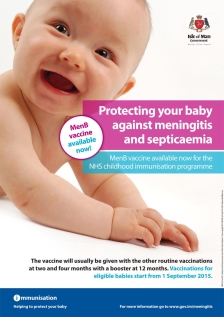 Changes are being made to the Island’s vaccination programme over the coming weeks. The first change will offer enhanced protection for children and young people against more strains of meningococcal bacteria; the second will provide protection for older people against shingles.
Changes are being made to the Island’s vaccination programme over the coming weeks. The first change will offer enhanced protection for children and young people against more strains of meningococcal bacteria; the second will provide protection for older people against shingles.
Meningococcal bacteria can cause Invasive Meningococcal Disease. This can lead to serious illness such as meningitis, which is an inflammation of the lining of the brain and spinal cord, and septicemia, an infection of the bloodstream. Both conditions can cause disability and even death.
Until now vaccination has been offered to children and young people against the C strain of meningococcal bacteria. This is provided for babies at three months of age with a booster at 12 months and a further booster at ages 14/15 (school year 10).
From August, the booster usually given at ages 14/15 will be replaced with a new combined vaccination against the A, C, W and Y strains of meningococcal bacteria. A catch–up programme will be offered to every pupil from school years 10 to 13 over the coming years.
The added protection from the W strain is particularly important as it has become more common amongst those in their late teens and early 20s. As such, all students currently aged 17/18 (school year 13) and those aged 19 – 25 who will be attending higher education for the first time this year will also be offered the vaccination urgently from the 1 August this year.
From September, babies born after June this year will be offered a vaccination against the B strain of meningococcal bacteria at two, four and 12 months of age. There will also be a catch-up programme for infants born between 1 May and 30 June 2015. The meningococcal C vaccination will continue as above.
As well as changes to the Invasive Meningococcal Disease vaccination programme, from September those aged 70 to 79 will be offered a vaccination to protect them against shingles.
The condition usually causes a painful rash that develops into itchy blisters and is a reactivation of a previous chickenpox infection. Although not life-threatening, shingles can be very painful and debilitating and affects people more commonly as they get older.
Minister for Health and Social Care, Howard Quayle MHK said:
'Vaccination programmes such as these are the bedrock of preventing ill-health from occurring, which has to be the first duty of a modern health service. I welcome the changes to our comprehensive on-Island programme, which is based upon robust clinical evidence, and mirrors the UK vaccination programme.
'Vaccinations help give peace of mind to individuals and families for the protection they offer against some of the most serious and sometimes life threatening diseases.'
The changes are in-line with advice from the Joint Committee on Vaccination and Immunisation an independent expert committee and executive body established in England to advise on immunisations.
The public can contact their GP Practice to discuss the vaccination programmes. GP Practices will be letting patients know when their particular vaccinations are due and inviting them to take part.
Leaflets and information are available at GP Practices, pharmacies and online at http://www.gov.im/meningitis and http://www.gov.im/shingles.
Photo courtesy of David Castillo Dominici at FreeDigitalPhotos.net










